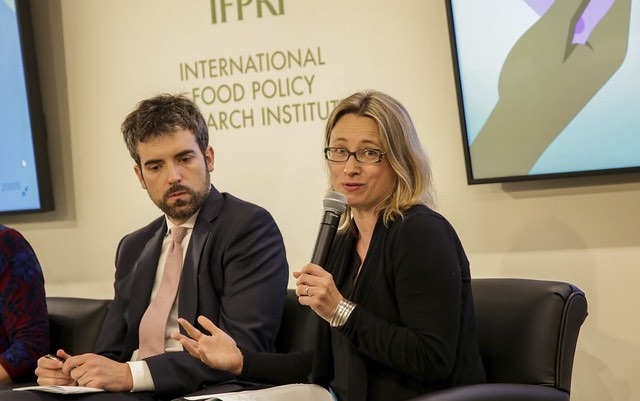Disasters driven by climate change are creating new risks, shocks, and stresses for already vulnerable households in low-income countries. Well-designed financial products and services can play a role in building resilience in the face of uncertainty for poor families.
At a May 9 IFPRI and Innovations for Poverty Action (IPA) seminar, participants discussed the potential of these programs and various designs and delivery mechanisms for increasing resilience—which are still not fully understood. The IPA review paper Building Resilience through Financial Inclusion: A Review of Existing Evidence and Knowledge Gaps provided the jumping-off point for the discussion.
“Each year millions of people fall into poverty, and it’s often because of … climate shocks, conflict shocks, health shocks, and other economic shocks,” said Frank Place, director of the CGIAR Research Program on Policies, Institutions, and Markets (PIM) at IFPRI. He distinguished between exposure to and sensitivity to such shocks: The former indicates the likelihood of experiencing a shock; the latter how severe the impact/suffering of that shock is to a person or community. PIM conducts extensive research around topics related to resilience, including foresight modeling, social protection, and natural resource governance, in the hopes of reducing both exposure and sensitivity to shocks.
It’s crucial to think about how financial instruments can build resilience prior to shocks, said IFPRI Research Fellow and co-author Berber Kramer, providing an overview of the paper. “Financial inclusion is not just about responding to shocks or risk preparedness, it’s also about investments in profitable opportunities that improve incomes and about investments in risk reduction,” she said, adding that financial tools can help households to grow out of the poverty that makes them vulnerable to shocks.
Kramer also noted some promising tools for investment, including weather index insurance and livestock insurance. Research shows that where these are available, they can in turn lead to higher investments in agriculture by reducing exposure to risk. However, she added, lack of demand remains a major hurdle and more rigorous research is needed.
“We’ve come from an industry that has made too many claims in the past, and we’ve suffered from that when we’ve said we’re going to eradicate poverty,” said Mayada El-Zoghbi, lead of strategy, research, and development at the Consultative Group to Assist the Poor (CGAP), and that means expectations should be based on research and evidence.
CGAP, she said, aims to reframe how people think about financial inclusion to benefit the poor. Too much responsibility is put on poor people to lift themselves out of poverty, she said, while research shows that markets and many other factors play important roles, in addition to household dynamics, in improving well-being.
How can financial products be better-designed to boost resilience among diverse populations? Mercy Corps Senior Director for Resilience Olga Petryniak cited the organization’s work with pastoral households in Ethiopia, where it assists those forced to leave the vocation due to drought with a combination of financial services and other risk-reducing interventions. She also cited Mercy Corps’s experience in Ethiopia’s Somali region during the 2016 drought, where evidence showed that households that received financial inclusion support, along with other interventions, were able to maintain food security, while those that didn’t experienced severe declines.
World Food Programme (WFP) Strategic Coordination Advisor Jordi Renart focused on WFP’s and Oxfam America’s risk management strategy, the R4 Rural Resilience Initiative (for risk reduction, risk transfer, risk reserves, and prudent risk taking), as a path that households can take to achieve sustainable food security and livelihoods, and to strengthen communities in the face of shocks. R4 covers more than 90,000 farmers in six countries and has triggered over 2 million payouts to 63,000 farmers. This experience shows that insurance as a standalone program is insufficient to promote investment, and that designing and adjusting products in a participatory manner is critical, Renart said.
The presentations were followed by a robust panel discussion moderated by IPA Chief Research and Policy Officer Radha Rajkotia. Concluding the event, presenters called for more private-public partnerships among governments, financial service providers, donors, and researchers to encourage innovation and scaling up of promising solutions.
Katarlah Taylor is an IFPRI Senior Events Specialist.







